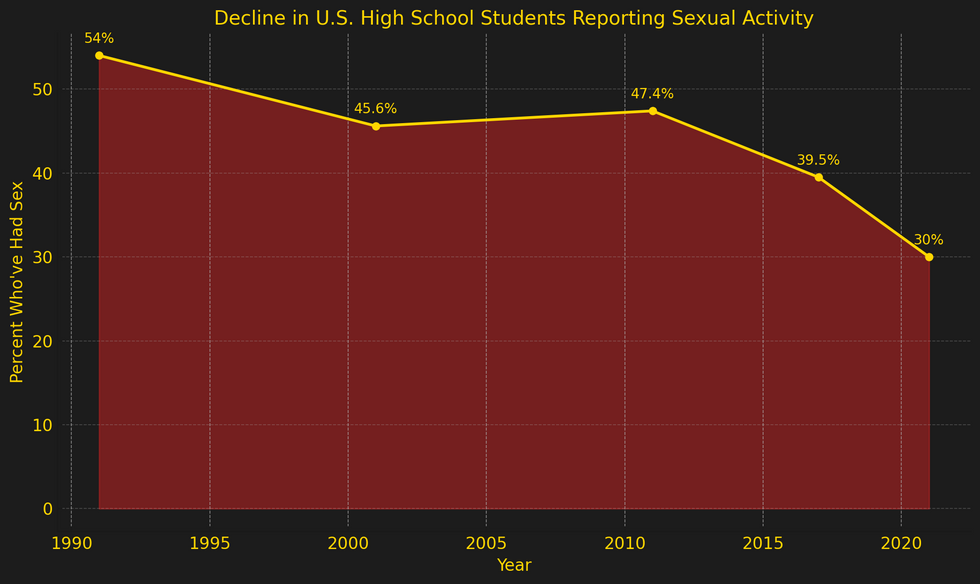Why Are Americans Losing Their Virginity Later Than Ever?
- Dillon Wall

- Jun 24, 2025
- 3 min read

Why Are Americans Losing Their Virginity Later than Ever?
In 2024, it is becoming increasingly more common for young Americans to reach adulthood without ever having sex. Compared to previous generations, Gen Z is waiting longer to have sex or choosing not to have sex at all. National surveys suggest that the average age of first sexual intercourse in the United States has hovered around 17 years, but that number is starting to shift upward. 1 in 8 people in their early 20s report never having sex, a dramatic change from the Baby Boomer or Gen X era.
This change highlights a cultural, technological, and psychological shift. From the rise of social media and dating apps to changes in sexual education, mental health awareness, and evolving attitudes about relationships, the story behind these numbers is more complex than just a generational divide.
Virginity Loss Over Time: Historical Stats
So, how has the average age of losing virginity changed over the last 100 years? Dramatically. Here’s a breakdown of how the average age has evolved over the years.
Early 1900s: A Culture of Restraint
In the early 20th century, sex outside of marriage was extremely taboo- especially for women. For those born before 1910, only 12% of women and 60% of men reported having premarital sex, according to the Kinsey Institute’s early research. The average age of first sex was often after marriage, which tended to occur in the late teens or early twenties.
This was a reflection of a conservative and religious moral code that prized virginity as a sign of innocence or purity- especially for women. Social pressure, a lack of contraception, and limited sexual education all contributed to this
The median age of first intercourse for women was estimated at ~20 to 21, typically occuring after marriage.
The average age for men ranged from 18-19, often before marriage, but still later than modern standards.
In 1900, the average age of a first marriage was 26 for men and 22 for women.
1960s-70s: The Sexual Revolution Lowers the Age
The arrival of the birth control pill in 1960, combined with the rising counterculture movement, dramatically reshaped American sexuality. The idea of “free love” gained traction and premarital sex became less stigmatized.
By the 1970s, the median age of first intercourse had dropped to around 16-17 for both men and women. Sex before marriage had less of a stigma and was increasingly expected.
1980s-90s: Stabilization
As AIDS swept across the globe, a heightened sense of caution entered the conversation prompting a spike in sexual education. Safe sex campaigns, increased sexual education in schools, and the rise of abstinence programs all influenced the culture. But, despite the fear, sexual activity was still prevalent.
The average age of losing virginity was 16.8 for men and 17.2 for women, according to Guttmacher Institute and CDC surveys.
2000s-2010s: Abstinence
The median age hovered around 17 years old, but fewer teens were reporting having sex. Between 1991 and 2017, the percentage of high school students who had sex dropped from 54% to 39.5% (According to the CDC’s Youth Risk Behavior Surveillance System).
This drop could be seen as signs of a shift in culture as consent and emotional readiness became a priority in the mainstream media.
2020s: The Sexless Youth
Trends are showing that delayed or absent sexual activity is increasing. Some professionals refer to this as the “virginity recession.” With sex being more accessible though the internet, it is becoming less frequent in real life.
As of 2021, only 30% of high schoolers said they had lost their virginity and 15% of people in their early 20s reported never having sex.
Among adults 18-24, the number of those still holding their virginity has increased with males being more likely to report no sexual activity than women.
So, What’s Going on?
This drastic shift is obviously a complex one and can be attributed to many factors. Social media, gaming, pornography, and entertainment in general have become immersive and addicting. Simulated intimacy may be a root cause.
The increasing mental health crisis could also play a role. Dating apps are also more damaging than helpful with the priority being on hookups and physical attraction. It makes the most attractive people more confident while making unattractive people less confident.
A New Norm
Virginity is changing; less people are losing it, and they’re losing it at different ages. While the age Americans are losing their V-card is still hovering around 17, less people are reporting sexual experiences.
Some people may view this as a good thing. Others not so good. But, we can only observe how it will continue to change and see the outcomes for ourselves.








Comments